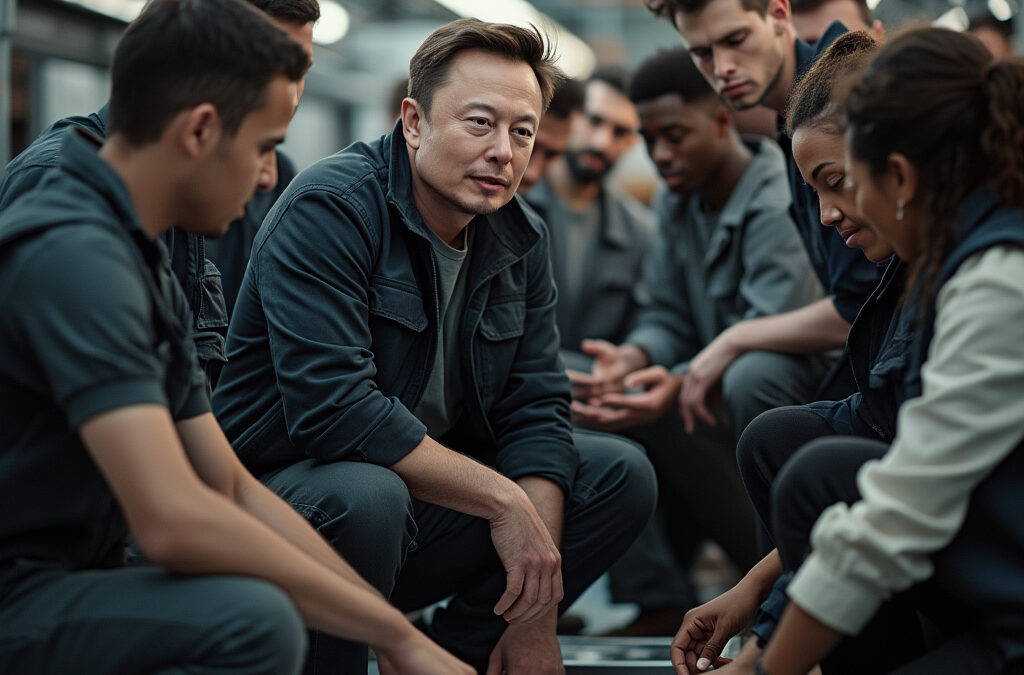With 7 Short Words, Elon Musk and Tesla Just Taught a Key Leadership Lesson (Whether They Meant to or Not)
Elon Musk, the visionary CEO of Tesla and SpaceX, has once again made headlines—not for a groundbreaking product launch or a daring futuristic prediction, but for a simple yet profound statement. In just seven words, Musk conveyed a leadership philosophy that has resonated widely: “Failure is an option here. If things…” This concise message, though incomplete, speaks volumes about Musk’s approach to innovation, risk-taking, and building a culture that embraces experimentation.
Musk’s philosophy is more than just a catchy soundbite. It reflects a core principle of his leadership style: the belief that failure is not only inevitable but also essential for progress. By openly acknowledging that failure is an acceptable outcome, Musk creates an environment where his teams feel empowered to push boundaries, challenge the status quo, and explore unconventional solutions. This mindset has been instrumental in driving Tesla’s reputation as a pioneer in the electric vehicle and clean energy industries.
At Tesla, failure is not punished but treated as a learning opportunity. This approach fosters a culture of innovation, where employees are encouraged to take calculated risks without the fear of repercussions. Musk’s philosophy is a stark contrast to the risk-averse cultures prevalent in many traditional organizations, where the fear of failure often stifles creativity and limits potential.
But Musk’s leadership extends far beyond this seven-word mantra. His approach to leadership is multifaceted, blending bold vision with practical execution. From leading by example to prioritizing efficiency and trust, Musk’s methods offer valuable lessons for leaders across industries. As Tesla continues to disrupt markets and push technological boundaries, Musk’s leadership philosophy remains at the heart of its success.
Leading from the Front
One of the most striking aspects of Musk’s leadership is his willingness to lead by example. He doesn’t ask his team to do anything he wouldn’t do himself. During the intense production challenges at Tesla, Musk famously slept on the factory floor to demonstrate his commitment. This approach not only shows solidarity with his team members but also builds trust and loyalty. By being in the trenches with his employees, Musk makes problem-solving a collaborative effort rather than a top-down directive. His philosophy is clear: leaders should serve their teams, not the other way around.
Efficiency and Focus
Musk is also known for his ruthless efficiency, particularly when it comes to time management. His approach to meetings is a prime example of this. He believes that meetings should include only 4-6 people who are absolutely necessary. He has been known to cancel frequent meetings and only meet when truly needed. If someone isn’t adding value or has nothing to contribute, they can leave. This focus on efficiency ensures that time is spent productively and that organizational resources are directed toward solving real problems.
Trust and Equality
One of Musk’s most distinctive leadership qualities is how he values input from all levels of the organization. At Tesla, he has been known to bypass management layers to speak directly with line workers. He trusts employees who have hands-on experience with problems and treats all employees equally regardless of their position. A notable example occurred when the Tesla Model X was experiencing door problems. Rather than relying solely on his engineering team, Musk sought out the line worker who was best at fixing the doors. When the engineering team dismissed the worker’s concerns, Musk sided with the line worker’s practical experience, saying “This guy knows more than you do” and giving the team a deadline to fix the issues.
Musk’s seven-word philosophy about embracing failure, combined with his approach to leading by example, prioritizing efficiency, and valuing input from all levels, creates a leadership style that fosters innovation and problem-solving. This approach has been instrumental in driving Tesla’s and his other companies’ ability to disrupt industries and achieve ambitious goals.
Conclusion
Elon Musk’s leadership philosophy, encapsulated in his seven-word statement, underscores the importance of embracing failure as a catalyst for innovation. By leading by example, prioritizing efficiency, and fostering trust through equal input, Musk creates an environment where creativity and problem-solving thrive. These principles have been instrumental in driving Tesla’s success and offer valuable lessons for leaders across industries, highlighting the power of a culture that values experimentation and collaboration.
Frequently Asked Questions
What is Elon Musk’s seven-word philosophy on failure?
“Failure is an option here. If things…” This statement reflects Musk’s belief that failure is essential for progress and innovation.
Why is failure important in Musk’s leadership approach?
Failure is treated as a learning opportunity at Tesla, encouraging employees to take risks and push boundaries without fear of repercussions, fostering a culture of innovation.
How does Musk lead by example?
Musk leads by example through actions like sleeping on the factory floor during production challenges, demonstrating solidarity and commitment to his team, and making problem-solving a collaborative effort.
What is Musk’s approach to meetings?
Musk emphasizes efficiency in meetings, limiting participants to 4-6 essential individuals and only meeting when necessary to ensure productivity and focus on solving real problems.
How does Musk build trust within his organization?
Musk builds trust by valuing input from all levels, bypassing management layers to engage directly with line workers, and treating employees equally regardless of their position, as seen in the Tesla Model X door issue resolution.

